Headaches are a common concern for women, and experiencing them daily can be overwhelming. Understanding what causes headaches everyday in females is essential for finding relief and improving quality of life. Many women suffer from daily headache in women due to stress, poor sleep, or hormonal fluctuations.
Factors like female migraine triggers, dehydration, and tension headache in females often make the pain persistent. Even lifestyle habits, such as skipping meals or long screen time, can worsen headaches. By identifying the root causes and learning effective coping strategies, women can reduce the frequency of these painful episodes and regain control over their well-being.
Common Reasons Behind Daily Headaches in Women
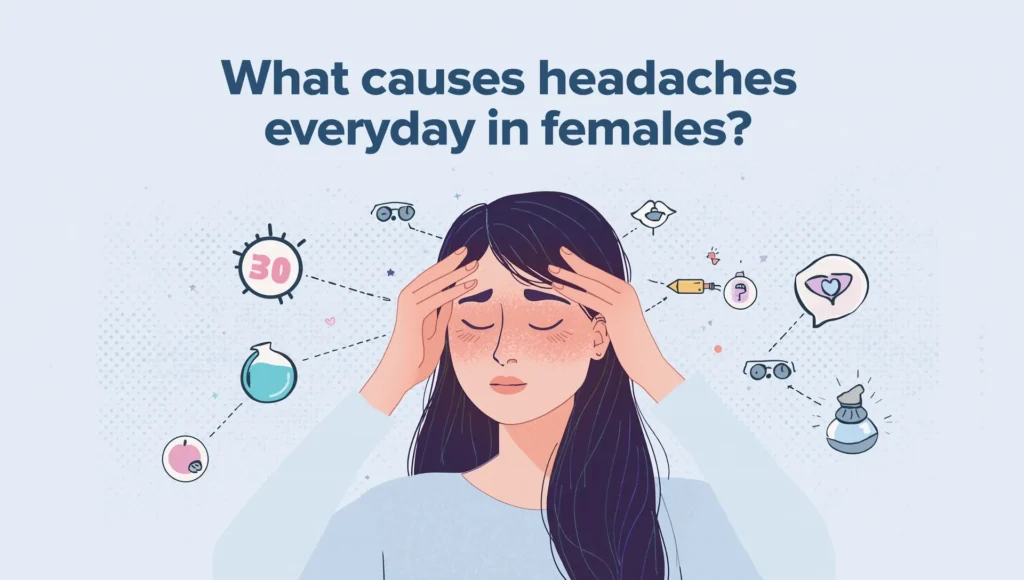
Daily headaches often stem from stress, poor sleep, dehydration, and posture problems. Women juggling work, family, and personal responsibilities may experience chronic tension in the neck and shoulders, contributing to constant pain. Additionally, skipping meals or irregular eating patterns can trigger persistent headache causes. These headaches are often dull but can interfere with concentration and daily productivity.
Sometimes, environmental factors such as loud noises, harsh lighting, or long screen time can worsen the pain. Being aware of these common triggers allows women to take proactive steps, like adjusting posture, staying hydrated, and maintaining a regular sleep schedule. Chronic headache causes often combine multiple lifestyle factors, making simple adjustments highly effective.
Hormonal Changes and Their Role in Headaches
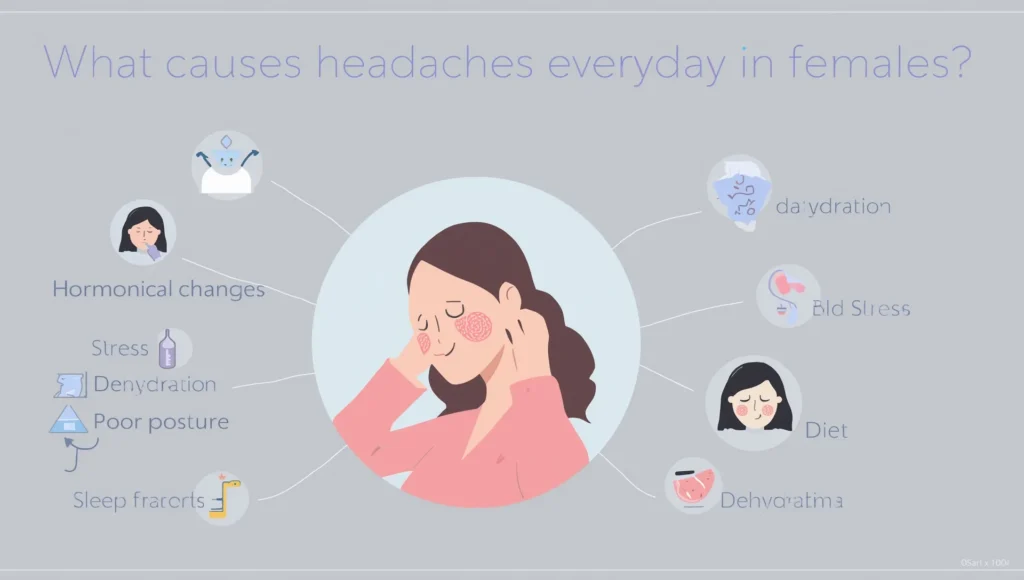
One major reason for what causes headaches everyday in females is fluctuating estrogen levels. Women often experience headaches during menstruation, pregnancy, or menopause due to hormonal imbalances. These menstrual cycle headaches can be cyclical and predictable, but sometimes they become persistent.
Hormonal headaches can also be triggered by oral contraceptives or sudden changes in hormone therapy. Understanding your cycle and identifying patterns can help you manage these headaches more effectively. Many women notice relief when they maintain consistent sleep patterns, exercise moderately, and avoid triggers such as caffeine or processed foods during sensitive times.
Headaches Related to Stress and Anxiety
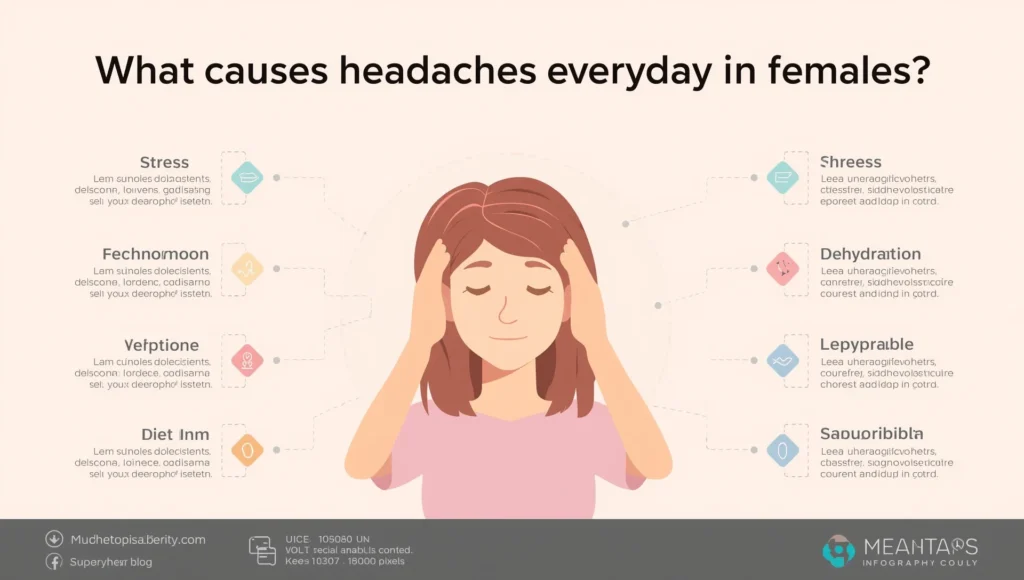
Stress headaches in women are incredibly common. Anxiety, tight deadlines, and constant multitasking often lead to tension in the neck, shoulders, and scalp. These headaches are usually dull but can become sharp during stressful moments.
The brain releases stress hormones like cortisol, which can constrict blood vessels and amplify pain signals, making headaches more intense. Women under chronic stress may experience daily headache in women patterns. Relaxation techniques such as deep breathing, yoga, or meditation can help regulate stress hormones and reduce headache frequency.
Migraine in Women: Why It’s More Common
Migraines are another major reason for what causes headaches everyday in females. Women are three times more likely than men to suffer from migraines due to hormonal fluctuations. Triggers include bright lights, strong odors, certain foods, and sleep disturbances.
| Migraine vs Tension Headache | Symptoms | Duration | Common Triggers |
|---|---|---|---|
| Migraine | Nausea, sensitivity to light/sound | 4–72 hours | Hormones, food, stress |
| Tension Headache | Pressure around forehead/neck | 30 min–7 days | Stress, poor posture |
Understanding your headache type is critical. While tension headaches often respond to lifestyle changes, migraines may require medical interventions or preventive treatments.
The Impact of Poor Diet and Dehydration
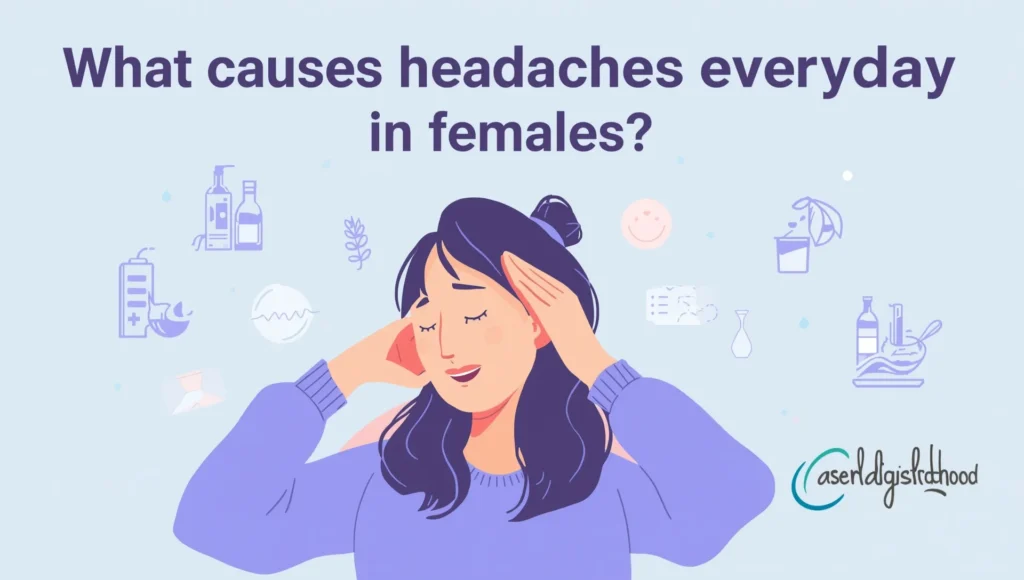
Diet plays a significant role in female migraine triggers. Skipping meals, excessive caffeine, sugar, and processed foods can cause persistent headache causes. Dehydration is particularly common, as women may underestimate their daily water intake.
For example, drinking enough water, eating small but frequent balanced meals, and limiting trigger foods such as chocolate, cheese, or artificial sweeteners can drastically reduce headache frequency. Maintaining a hydration and nutrition routine is one of the simplest yet most effective methods for daily headache relief.
Medical Conditions That Cause Frequent Headaches
Sometimes, what causes headaches everyday in females goes beyond lifestyle or hormonal factors. Certain thyroid imbalances, high blood pressure, sinus infections, and eye strain can lead to chronic pain.
Eye strain from long screen time is particularly common among working women. Regular eye check-ups, ergonomic workstations, and breaks from screens can prevent daily headache in women patterns. Similarly, untreated blood pressure headaches or sinus infection pain require medical evaluation to avoid complications.
When Should You See a Doctor?
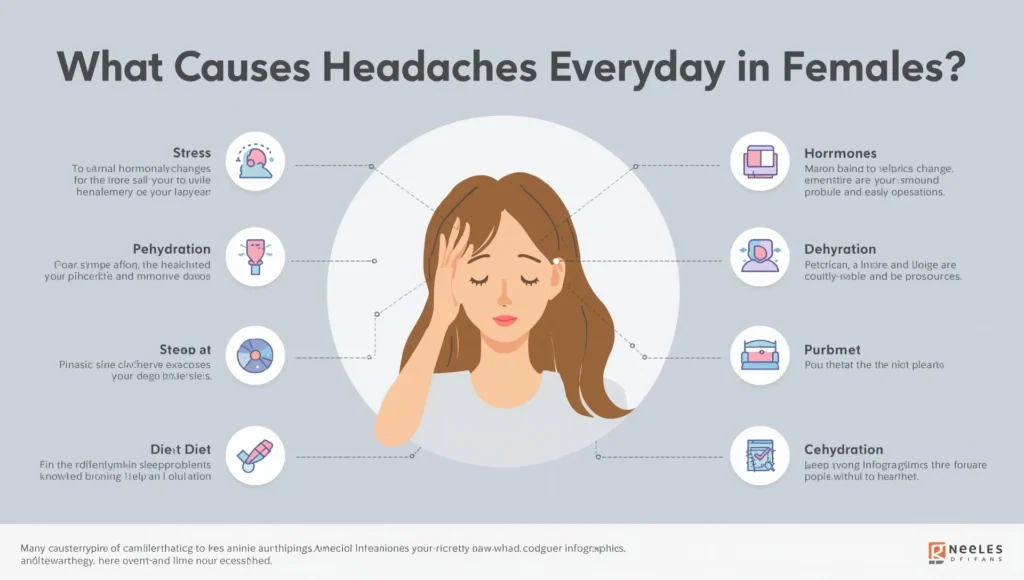
Not all headaches are harmless. Seek medical attention immediately if headaches are sudden, severe, or accompanied by blurred vision, dizziness, or nausea. Conditions like migraines with aura or neurological issues can mimic stress headaches in women but require professional treatment.
Keeping a headache diary helps your doctor identify triggers and patterns. Include details like timing, duration, intensity, and possible triggers. This can speed up diagnosis and improve treatment plans, making it easier to manage chronic headache causes effectively.
Lifestyle Changes That Help Prevent Headaches
Preventing headaches often involves lifestyle adjustments. Maintaining adequate sleep, regular physical activity, hydration, and a balanced diet are key steps. Avoid prolonged screen exposure and practice stress management techniques daily.
Simple practices such as stretching, taking short walks, and maintaining good posture reduce tension headache in females. Additionally, regular relaxation or mindfulness exercises help regulate stress hormones, which are a common contributor to persistent headache causes.
Effective Home Remedies for Everyday Headaches in Females
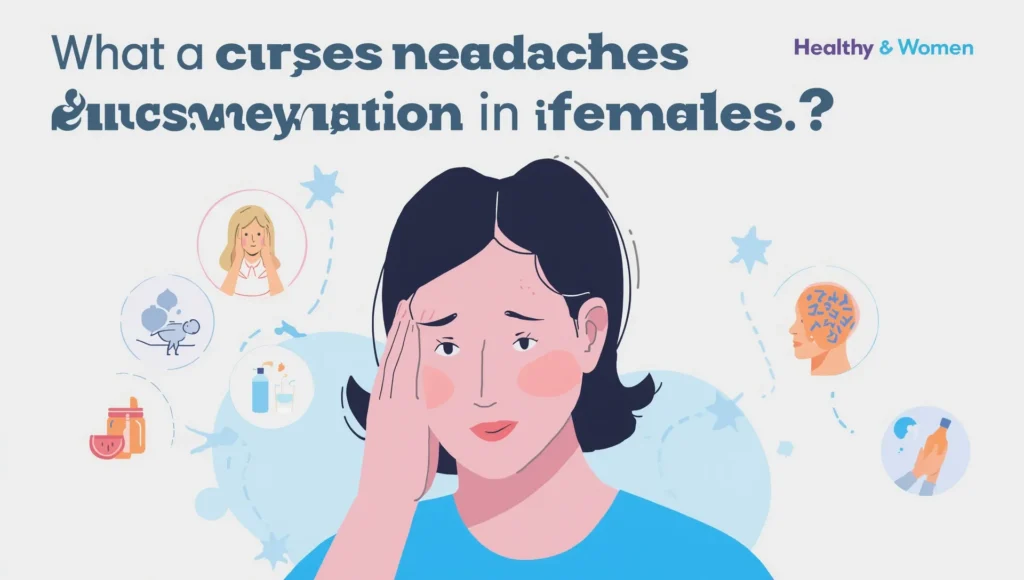
Several home remedies can alleviate what causes headaches everyday in females naturally. Applying a warm compress to the neck, drinking herbal teas like chamomile or ginger, and practicing gentle stretching can provide relief.
A calm, dark environment helps if headaches are triggered by light or sound. Acupressure, massage, and aromatherapy can also reduce pain intensity. While these remedies may not cure underlying medical causes, they help manage daily headache in women and improve quality of life.
Final Thoughts on What Causes Headaches Everyday in Females
Headaches in women are multifactorial, often resulting from a combination of hormonal changes, stress, lifestyle habits, and medical conditions. By identifying triggers, practicing healthy habits, and seeking professional care when necessary, women can significantly reduce the frequency and intensity of headaches.
Remember, persistent headache causes should never be ignored. Regular check-ups, proper hydration, balanced diet, and stress management are the foundation for a headache-free life. Understanding your body’s signals and making informed choices is the key to long-term relief.
FAQs
What would cause a female to get a headache every day?
Daily headaches in women can result from hormonal changes, stress, poor sleep, dehydration, or underlying medical conditions. Lifestyle factors like diet and screen time also play a major role.What are the top 3 causes of headaches?
The most common causes are tension/stress headaches, migraines, and dehydration. Poor posture and eye strain are also frequent triggers.What are the 7 types of headaches?
Seven types include tension, migraine, cluster, sinus, hormonal, rebound, and cervicogenic headaches. Each has distinct triggers and symptoms.What does a hormone headache feel like?
A hormonal headache often feels like a dull, throbbing pain on both sides, sometimes accompanied by fatigue or mood changes.Can brain tumors cause headaches?
Yes, brain tumors can cause persistent headaches, often worse in the morning or accompanied by nausea, vision changes, or neurological symptoms.Can low iron cause headaches?
Yes, iron deficiency can reduce oxygen in the brain, leading to fatigue and frequent headaches.What vitamin deficiency causes headaches?
Deficiencies in vitamin D, B12, or magnesium can trigger frequent headaches and migraines in some people.How did I know I had a brain tumor?
Symptoms may include persistent headaches, nausea, vision changes, seizures, or balance problems. Diagnosis requires medical imaging.What are bad signs of headaches?
Red flags include sudden severe pain, vision changes, weakness, confusion, or vomiting. These require urgent medical attention.Can a CT scan be normal but still have a headache?
Yes, CT scans may appear normal if headaches are caused by migraines, tension, or hormonal issues rather than structural brain problems.What causes brain tumors?
Brain tumors can result from genetic mutations, abnormal cell growth, prior radiation exposure, or unknown factors.What hormone imbalance causes headaches?
Fluctuations in estrogen and progesterone often trigger hormonal headaches, especially during menstruation, pregnancy, or menopause.How do I know my headache is not a tumor?
Most headaches are harmless; seek medical advice if pain is persistent, severe, or accompanied by neurological symptoms to rule out tumors.What causes brain aneurysms?
Brain aneurysms often result from weakened blood vessel walls, high blood pressure, genetic factors, or injury.What is the biggest symptom of a brain tumor?
The most common symptom is a persistent headache that worsens over time, often with nausea, vision changes, or neurological issues.Can a blood test detect a brain tumor?
No, blood tests cannot detect brain tumors; imaging like MRI or CT is required for diagnosis.What time of day are brain tumor headaches worse?
They are often worse in the morning, sometimes improving as the day progresses due to pressure changes in the brain.Why am I getting headaches every day all of a sudden?
Sudden daily headaches can be caused by stress, poor sleep, dehydration, dietary changes, hormonal shifts, or new medical conditions.





Pingback: Headaches Explained: Causes, Types, And Treatments You